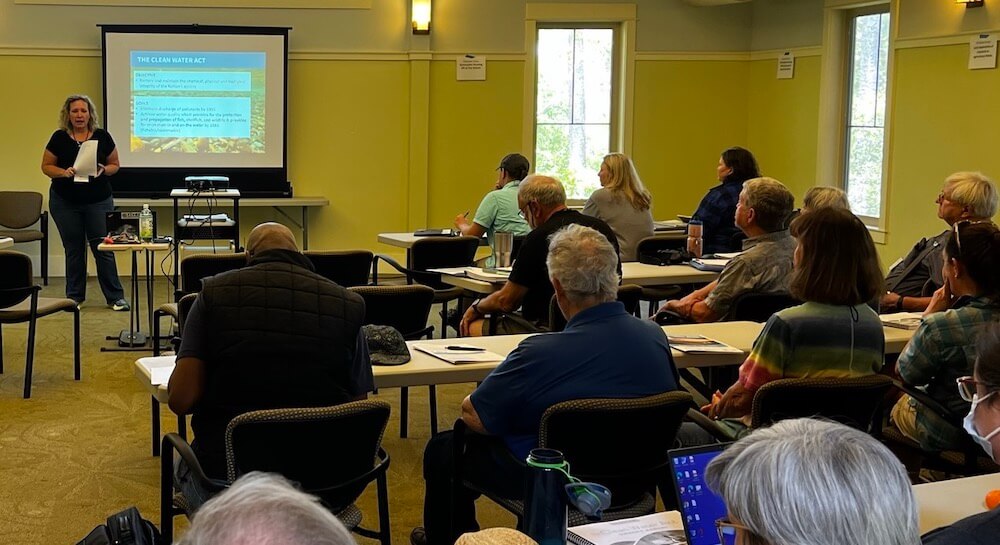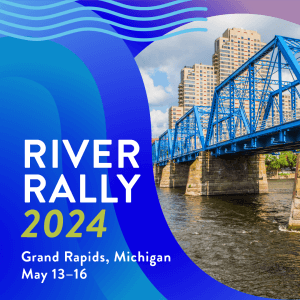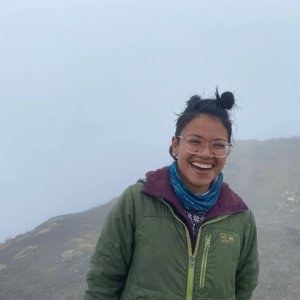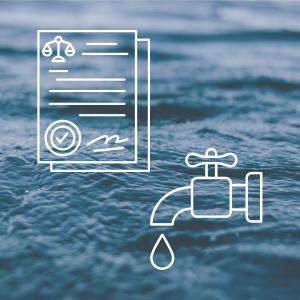River Voices: September 2023

Welcome to the September 2023 edition of River Voices. This month we’re sharing our advocacy work, done both for and in collaboration with the national network. Plus, explore two new learning series join the Online Learning Platform and support the network for World Rivers Day!
Advocacy for and with the Network
As we build collective impact through a powerful, inclusive network, advocacy is a key element. We’re thrilled to share the launch of new advocacy tools this month, as well as the ways we continue to advocate alongside partners and Network members to call for safe and affordable drinking water, healthy rivers, and climate resilient communities.
Be inspired this month by two blog posts from our Policy Team: the first blog on new advocacy tools and another blog on how – and why – we collaborate with coalitions from the network. And, meet Maritza Mendoza of GreenLatinos below, a partner in this advocacy work through multiple coalitions.
A highlight of the [Clean Water Act Manual] workshop, which was led by River Network staff April Ingle, was to have our watershed-based partners connect sections of the Manual to their work across the state. This not only served as a way to understand the use of the Manual, but also as an update to our Alliance partners on the important work these organizations are doing. Participants were excited to have this great resource updated to use in their communities and suggested we have this workshop every year at our annual gathering!
-Cindy Lowry, Executive Director, Alabama Rivers Alliance
River Rally Session Proposals Are OPEN
We are accepting session proposals for River Rally 2024 through November 10!
We’ve improved the process this year, so be sure to read through the River Rally Session Proposal Submission Guidance for information on how to prepare and submit your proposal. There, you’ll also find information on the proposal selection process and the discounts and scholarship opportunities available to speakers.
Learn more and submit a Rally session proposal by November 10.
“Joy is very important to me because this work is very exhausting sometimes, and often heartbreaking to understand all the injustices and inequities that continue to be perpetuated… I find a lot of joy in connecting, in our caucus and in other coalitions, and having conversations with folks and learning more about what keeps them motivated and how they are finding their own joy.”
Maritza is Water, Equity, and Ocean Program Advocate at GreenLatinos.
Last month, we launched our Online Learning Platform, with a series on State Revolving Fund Advocacy. Now, two NEW series have joined the platform: one bringing our Drinking Water Guide to life and another diving deep into the Clean Water Act through our Clean Water Act Owner’s Manual.
All are FREE and available to all. Explore today and begin using these tools to support water access and quality in your community.
Learn more and sign up for the Drinking Water Guide series and the Clean Water Act series.
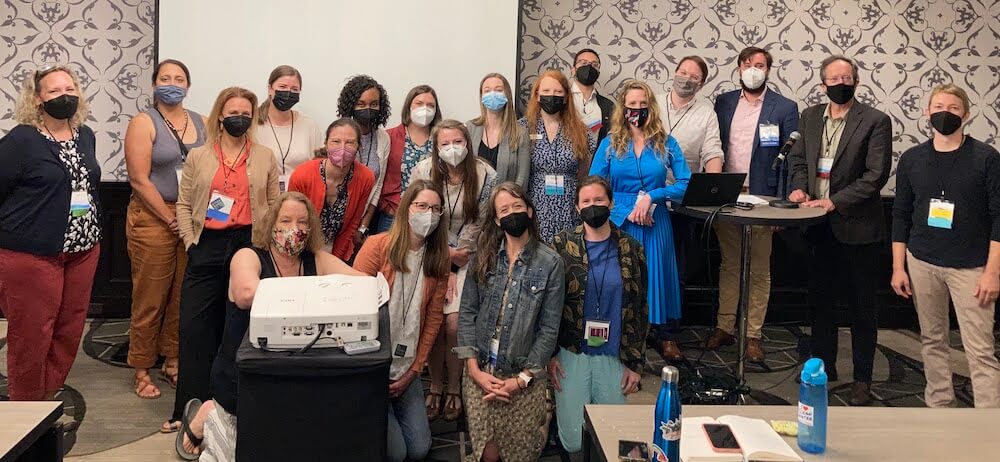
The Federal Water Policy Update peer learning network, gathering in-person during River Rally 2022. Photo by Imagine Photography.
In tandem with tools, manuals, and guides that equip water advocates, successful advocacy for safe and affordable drinking water, healthy rivers, and climate-resilient communities requires equitably working within diverse coalitions of organizations and individuals to build the necessary power and influence to effect change.
River Network is proud to work alongside, and lift up, a broad array of partners in coalitions to advocate for progress on these essential issues.
Read our blog on collaborative water advocacy, including the coalitions and other groups we work with and their impacts.
Tapping Into Federal Funding: An Advocate’s Toolbox
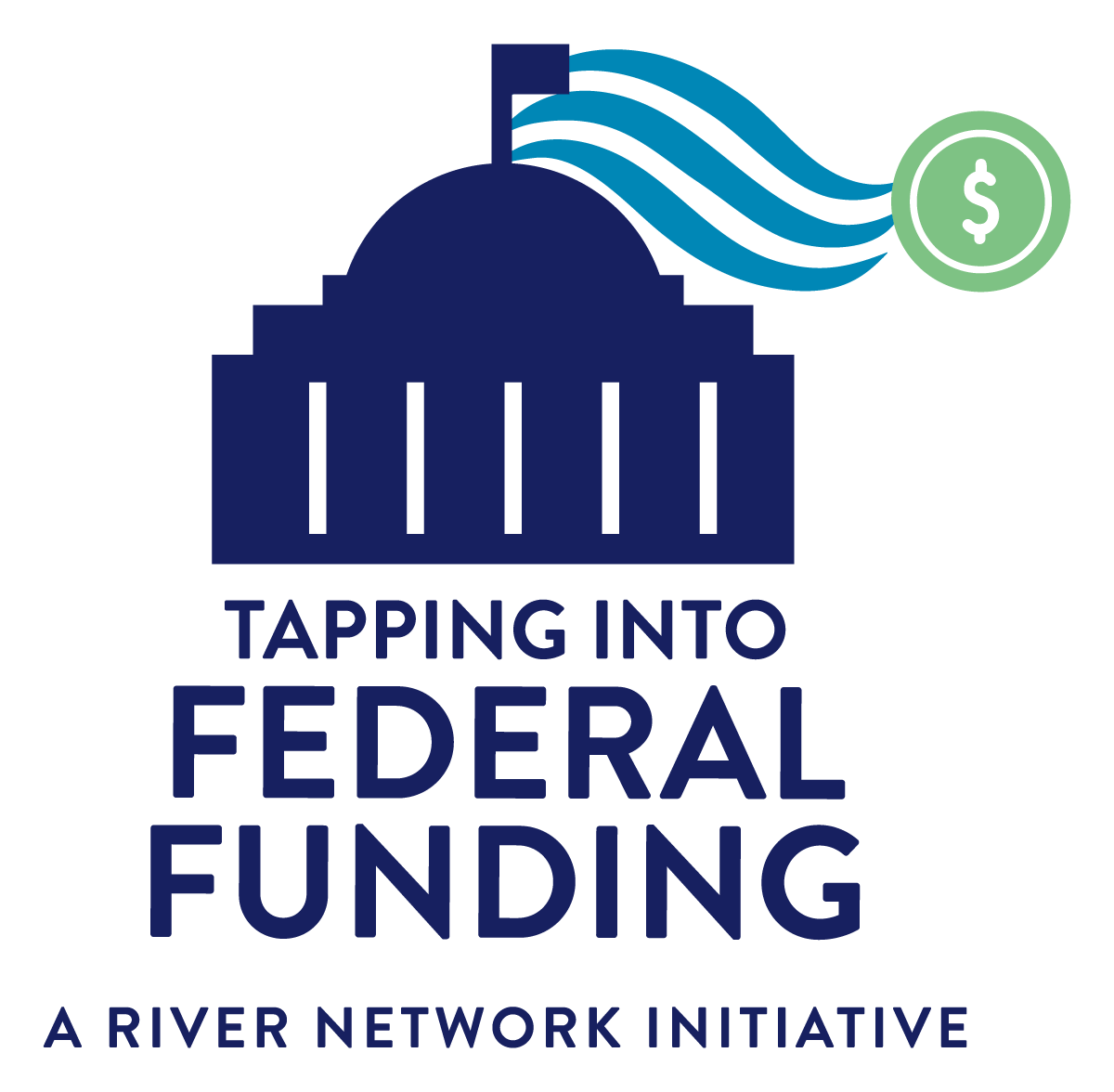
With countless resources, dashboards, and tools floating around related to water funding, it can be challenging to know what’s worth your time. Start with our team’s recommendations:
- Funding Integration Tool for Source Water Protection (FITS): EPA just updated their FITS website – this online one-stop-shop tool explains how users can integrate various federal funding sources for activities that protect sources of drinking water. The update included adding three additional federal funding programs to the tool including the following: EPA’s Sewer Overflow and Stormwater Reuse Municipal Grants program, U.S. Forest Service’s Forest Legacy Program, and Natural Resources Conservation Service’s and U.S. Forest Service’s Joint Chiefs’ Landscape Restoration Partnership program. Overall, fourteen federal funding programs are included in the tool that may be leveraged by states, tribes, and territories to implement different steps of a source water protection program.
- Water Program Portal: The newly launched Water Program Portal, created by Atlas Public Policy in collaboration with the Water Foundation, centralizes guidance on new federal funding for water established by the Bipartisan Infrastructure Law (BIL) and the Inflation Reduction Act (IRA). The Portal tracks open requests for proposals, information, and public comment, as well as $151 billion in funding for water programs. You have to sign up to access the Portal (it’s free) – make sure to check your junk folder because your welcome email might get diverted there.
- Water Finance Clearinghouse: EPA’s Water Finance Clearinghouse is another online portal to help communities locate information and resources that will assist them in making informed decisions for their drinking water, wastewater, and stormwater infrastructure needs. It includes two searchable databases: one contains available funding sources for water infrastructure and the second contains resources, such as reports, weblinks, webinars etc. on financing mechanisms and approaches that can help communities access capital to meet their water infrastructure needs.
Fish Barriers and Free-flowing Rivers: Challenges of Native Fish Recovery
September 12, 12:30pm PT / 3:30pm ET
This free virtual discussion hosted by the River Management Society continues a conversation about seemingly divergent priorities: protecting native fish species with fish barriers and maintaining the free-flowing characteristics of rivers. Join to discuss the issue with topic experts who are aiming to balance recovery of native fish with the preservation of remaining free-flowing rivers.
Register for Fish Barriers and Free-flowing Rivers: Challenges of Native Fish Recovery.
Digital Accessibility and Inclusive Communications Tips for the Water Movement
September 13, 12:30pm PT / 3:30pm ET
Join River Network and the Water Hub for a conversation about making your digital and communications content more accessible, inclusive, and welcoming for all communities. In this webinar, we’ll share some takeaways from the Water Hub’s Digital Accessibility Guide and River Network’s new Inclusive Communications Guide.
Register for Digital Accessibility and Inclusive Communications Tips.
UWLN Learning Series: Building Water Equity & Climate Resilient Communities for ALL
September 20, 10am PT / 1pm ET
Join us for part two of our six-part series, highlighting a variety of strategies that community-based organizations can use to help their communities anticipate, prepare for and respond to climate risks. This second session will cover how you can advocate for and participate in the planning and establishment of Resilience Hubs in your own community.
Summit on Climate & Environmental Justice, Racism & the Law
November 16-17; Durham, NC
Taproot Earth’s Just Transition Lawyering Network and partners are excited to share a Save the Date for a Summit on Climate and Environmental Justice, Racism, and the Law. This will be a space for frontline advocates, lawyers, and scholars–particularly those working on climate, environmental, energy, water, and land justice–to come together, share information, engage in political and legal education, build consensus around law and organizing strategies, and advance just solutions rooted in Civil Rights and Black Liberation. Space is limited!
2024 Riparian Restoration Conference: Restoration for the Future
March 5-7, 2024; Grand Junction, Colorado
Join RiversEdge West and over 200 river restoration professionals for a conference emphasizing building resilience in our rivers and riparian ecosystems, as well as the surrounding human communities. How can we support climate resilience in riparian restoration work? How can we ensure that restoration work has lasting impacts that benefit both ecological and human communities?
Learn more about the Riparian Restoration Conference and submit an abstract.
- 🧾 Connect to Build: Frontline Organization and Federal Infrastructure Funding Opportunities – a new report from SPARCC and its supporting partners, Emerald Cities Collaborative and the People’s Climate Innovation Center, shares lessons learned from frontline organizations on accessing federal funding opportunities.
- 📰 “Lahaina used to be a wetland” – recent reporting from HEATED speaks with Kaniela Ing, a seventh-generation Indigenous Hawaiian living in O’ahu and examines how colonization and climate change set the stage for the devastating Maui wildfires.
- 📖 Soil: The Story of a Black Mother’s Garden – Camille T. Dungy, poet and scholar, recounts the seven-year odyssey to diversify her garden in the predominantly white community of Fort Collins, Colorado. A gorgeous read about gardening, motherhood, environmental justice, and so much more.
- 🎉 Good news for North Carolina’s Watauga River Basin – thanks to community advocacy and support, 11 streams in the Watauga River Basin will soon receive special protections as Outstanding Resource Waters or High-Quality Waters. Congrats to all whose determination made this happen!


